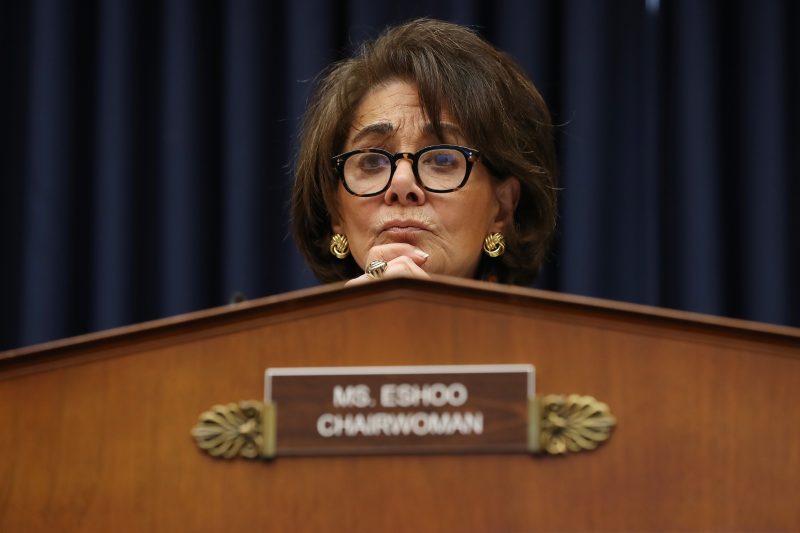Rep. Anna G. Eshoo (D-Calif.), who has held her Northern California seat for more than three decades, announced Tuesday she will not seek reelection in 2024.
“There’s been heaven and there’s been hell,” Eshoo, 80, said in an interview with The Washington Post about her lengthy tenure in Congress, noting that her decision to retire was ultimately a personal one based on a feeling that “it’s time” rather than any political circumstances. She intends to serve out the remainder of her term.
“People always ask us: How do you balance your personal life with your public life? My answer immediately is: It’s not balanced. This has to come first,” Eshoo said.
Eshoo’s retirement, first reported by the San Jose Spotlight, sets the stage for a fierce competition over her soon-to-be vacant seat representing California’s 16th Congressional District, which includes Silicon Valley and much of San Mateo and Santa Clara counties.
Eshoo was first elected to Congress in 1992 in what became known as the “Year of the Woman” — former senator Barbara Boxer and the late senator Dianne Feinstein were also elected to Congress from California that year. In a video announcing her retirement, Eshoo noted she was the first woman and the first Democrat to represent her district, which has since been renumbered because of redistricting, and that 66 of her bills have been signed into law by five presidents.
Picking the most memorable or most consequential of those bills, she told The Post, would be like choosing a favorite child — “because when I look at the bills, I immediately see the tough effort of giving birth to each one.”
One of her bills was the 1997 Reconstructive Breast Surgery Benefits Act, which she wrote after becoming outraged that private insurers were denying coverage of such surgeries after mastectomies because they deemed them cosmetic procedures.
Another popular bill originated in her living room, when she asked her family why the volume on the TV was so loud. Her brother-in-law told her it was because the commercials were airing much louder than the football game they were watching — so Eshoo authored a bill that would prevent such sudden increases in volume of advertisements. (“Leave it to Anna to do a two-page bill,” she said President Barack Obama quipped during the bill’s signing. She responded: “Mr. President, it was a one-page bill until the Senate got a hold of it.”)
And as the only Armenian American member in the House, Eshoo said one of her proudest achievements was helping shepherd a bipartisan resolution for the House to recognize the Armenian Genocide formally.
In a statement Tuesday, House Minority Leader Hakeem Jeffries (D-N.Y.) called Eshoo “a prolific legislator, innovator and barrier breaker,” as well as a personal mentor to him.
“For more than three decades, Rep. Anna Eshoo has ably represented her constituents in the Bay Area during an era of tremendous growth and change,” Jeffries said, touting her work on expanding health-care access and affordable housing in the Bay Area. “As a Member of Congress, Anna has exemplified Silicon Valley’s hallmark innovation and brilliance at every step of her public service journey.”
For nearly as long as she has held office, Eshoo has served on the House Energy and Commerce Committee, where she has been active on tech policy, which grew more pressing as the technology that emerged from the companies in her district evolved. She has pushed to make changes to Section 230, which shields internet companies from liability for user content.
Her push was spurred in part by the Jan. 6, 2021, insurrection, in which a pro-Trump mob stormed the U.S. Capitol in an attempt to stop the certification of Joe Biden’s electoral win. Eshoo remembers making her way through tunnel passages to an elevator bank when, suddenly, Capitol police officers poured through a door with guns drawn, shouting, “Capitol breached!”
Eshoo removed her heels and ran back through the tunnel, spotting fellow California Rep. Mike Thompson (D). Like many other lawmakers that day, the two sheltered inside an interior room of the Capitol, with furniture pushed up against the door, until the early evening hours.
In an op-ed in 2021, Eshoo argued that large social media companies should not enjoy Section 230 protections if their algorithms amplified content that later contributed to an act of terrorism. When the law was passed in 1996, she said, large internet platforms functioned more like community bulletin boards.
Such platforms now use “sophisticated, opaque algorithms to determine what content their users see,” she wrote then. “If companies such as Facebook push us to view certain posts or join certain groups, should they bear no responsibility if doing so leads to real-world violence?”
Eshoo has also sponsored bills that aim to increase online privacy and to combat domestic violence that is enabled by technology.
In 2018, Eshoo played a small but important role in bringing to light Christine Blasey Ford’s allegations of sexual assault against then-Supreme Court nominee Brett M. Kavanaugh. Ford, who lived in Eshoo’s district, first contacted the lawmaker’s office about Kavanaugh, and the two women met for about 90 minutes in July 2018 to discuss the allegations.
“At the end of the meeting, I told her that I believed her,” Eshoo told The Post then. “In telling her story, you know, there were details to it, and I believed her.”
More than three dozen House members have announced they will not seek reelection next year, either because they are retiring or seeking other office. Several of those are from California, including Democratic Reps. Barbara Lee, Adam B. Schiff, Grace F. Napolitano and Tony Cárdenas.
Eshoo’s district is solidly blue — President Biden won there by nearly 20 points in 2020 — and a race to succeed her is likely to attract several Democratic candidates. California holds a nonpartisan primary, in which all candidates are listed on the same primary ballot, regardless of party, and the top two finishers advance to the general election.
Cristiano Lima contributed to this report.





























